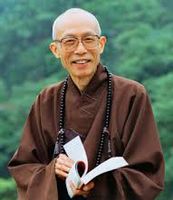Sheng Yen: Difference between revisions
No edit summary |
No edit summary |
||
| (2 intermediate revisions by the same user not shown) | |||
| Line 8: | Line 8: | ||
|MainNamePhon=Sheng Yen | |MainNamePhon=Sheng Yen | ||
|MainNamePin=Shèngyán | |MainNamePin=Shèngyán | ||
|AltNamesOther=Zhang Baokang | |AltNamesOther=Zhang Baokang; Chang Baokang | ||
|yearbirth=1931/01/22 | |yearbirth=1931/01/22 | ||
|yeardeath=2009/02/03 | |yeardeath=2009/02/03 | ||
Latest revision as of 18:11, 12 November 2019
| PersonType | Category:Ordained (Monks and Nuns) Category:Authors of English Works Category:Zen Buddhist Teachers |
|---|---|
| MainNamePhon | Sheng Yen |
| MainNamePin | Shèngyán |
| AltNamesOther | Zhang Baokang · Chang Baokang |
| bio | Sheng Yen (聖嚴; Pinyin: Shèngyán, birth name Zhang Baokang, 張保康) (January 22, 1931 – February 3, 2009) was a Chinese Buddhist monk, a religious scholar, and one of the mainstream teachers of Chan Buddhism. He was a 57th generational dharma heir of Linji Yixuan in the Linji school (Japanese: Rinzai) and a third-generation dharma heir of Hsu Yun. In the Caodong (Japanese: Sōtō) lineage, Sheng Yen was a 52nd-generation Dharma heir of Dongshan Liangjie (807–869), and a direct Dharma heir of Dongchu (1908–1977).
Sheng Yen was the founder of the Dharma Drum Mountain, a Buddhist organization based in Taiwan. During his time in Taiwan, Sheng Yen was well known as a progressive Buddhist teacher who sought to teach Buddhism in a modern and Western-influenced world. In Taiwan, he was one of four prominent modern Buddhist masters, along with Hsing Yun, Cheng Yen and Wei Chueh, popularly referred to as the "Four Heavenly Kings" of Taiwanese Buddhism. In 2000 he was one of the keynote speakers in the Millennium World Peace Summit of Religious and Spiritual Leaders held in the United Nations. (Source Accessed November 12, 2019) |
| YearBirth | 1931/01/22 |
| YearDeath | 2009/02/03 |
| BornIn | Nantong, Jiangsu, China |
| affiliation | Dharma Drum Mountain (Founder) |
| religiousaffiliation | Chan Buddhism |
| IsInGyatsa | No |
| Other wikis |
If the page does not yet exist on the remote wiki, you can paste the tag |

